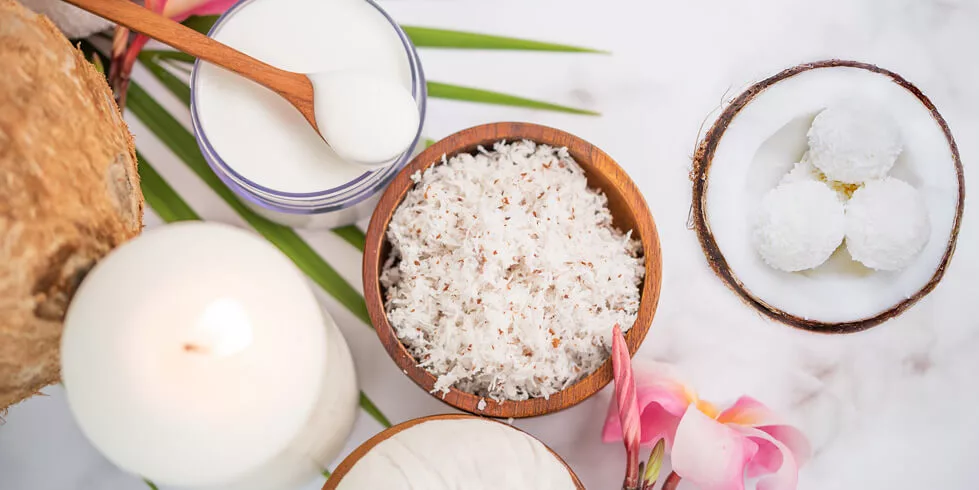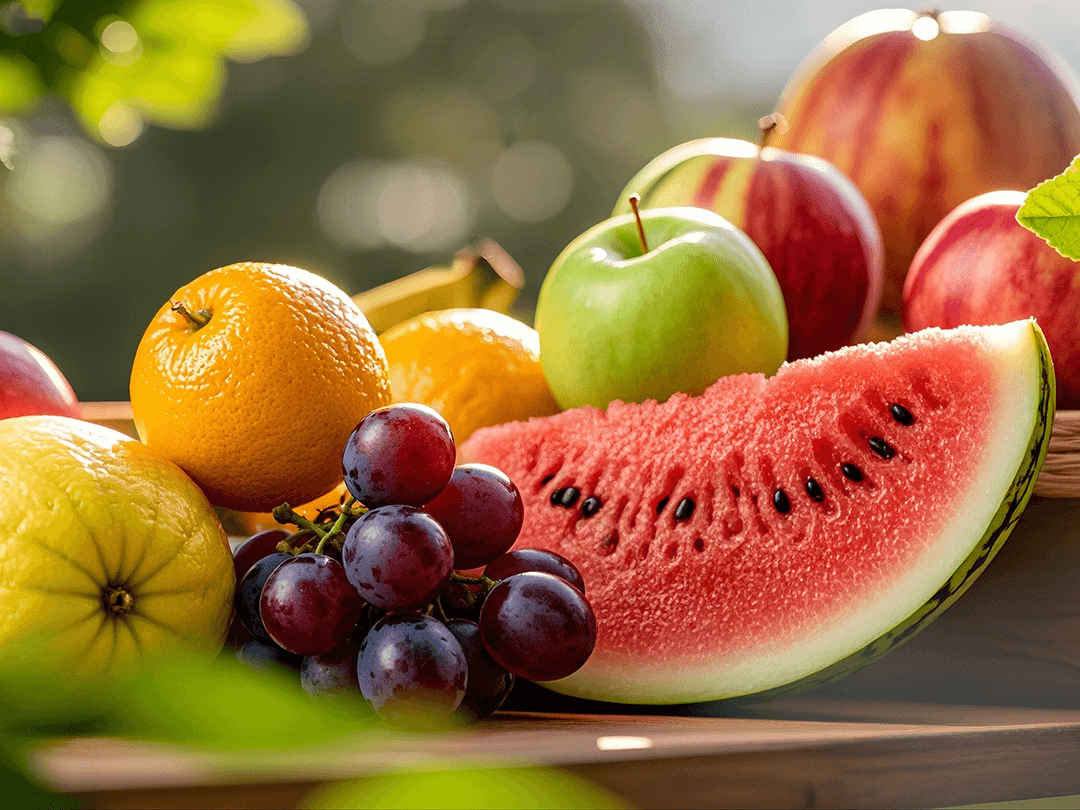Coconut is a healthy and tasty food that has many benefits for our health. There are many different coconut products that you can buy, such as coconut oil, sugar, milk, water, cream, vinegar, and protein.
In an article about coconut oil face masks and benefits, we learned a lot about the benefits of coconut.
Coconut products are very popular because they can be used in many ways and have many health benefits.
Coconut oil is especially good for us and is called a superfood because it can help with inflammation, weight management, and heart health.
People have known about the health benefits of coconut for a long time. It has been used to help with many illnesses like chronic fever, acid gastritis, foot cracks, worms, sores, and vomiting.
Some people even believe that it can cure diseases.
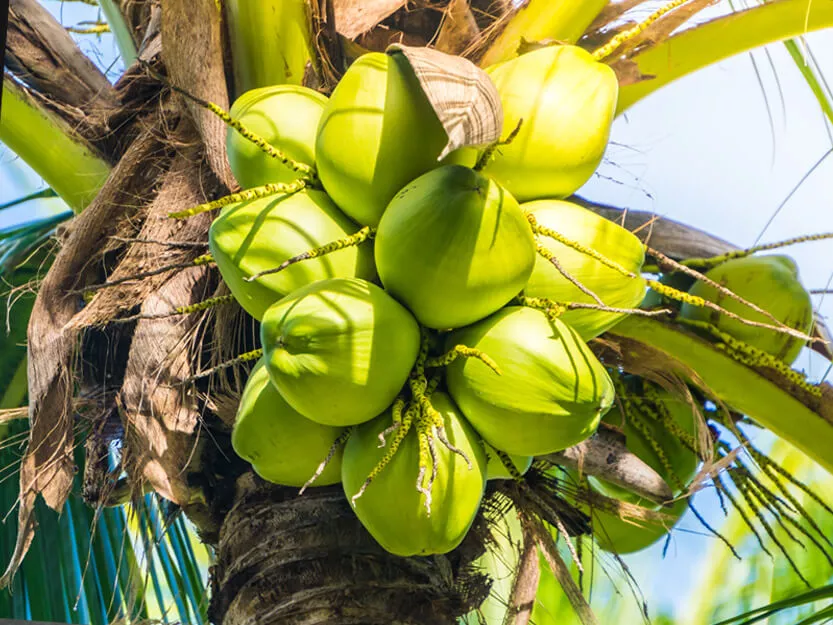
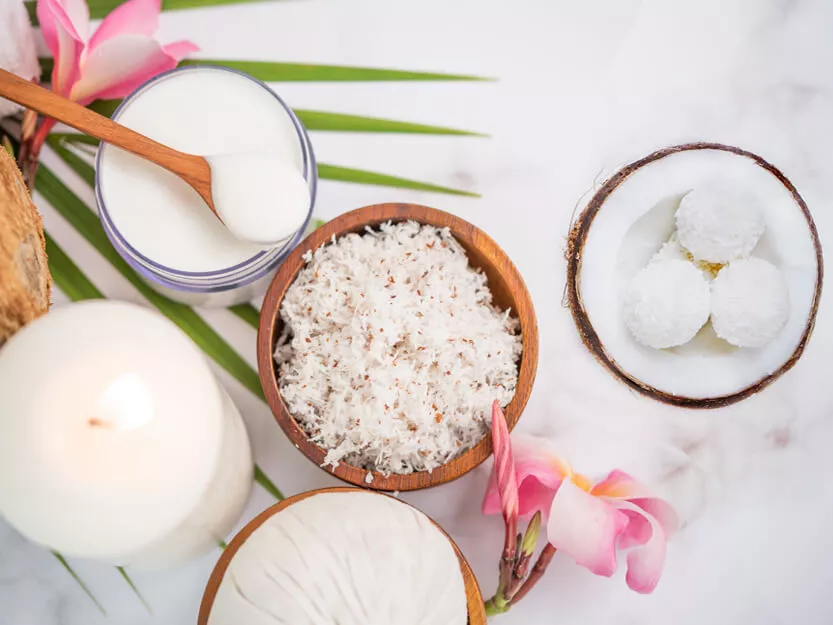
How can Coconuts be a Superfood?
The coconut is considered one of the ten most valuable trees in the world, providing food for millions of people, especially in the tropics, because of its versatility. A coconut tree can be the best.
When choosing a coconut, choose one that has no cracks, is heavy in size, and has a liquid-filled sound when shaken. The “eyes” should be dry and clean. Unopened coconuts can be stored at room temperature for up to six months.
A coconut is opened by piercing its eyes. You can drink the pale, slightly sweet coconut water inside the nuts by mixing it with lemon or lime juice.
The fleshy chunks of mature coconuts can be grated, chopped, eaten directly, or dried and substituted for packaged coconuts in recipes. Store it sealed for up to 4 days or frozen for up to 6 months.
Coconut milk and cream are made by heating water with crushed fresh or dried coconut. Both coconut milk and cream are used in cooking and making drinks.
The dried coconut flesh, called copra, is pressed to extract the coconut oil. Coconut water, flowers, oil, milk, and ash, are used medicinally. Currently, coconut is used in folk medicine like Ayurveda, Siddha, Tibetan, and Unani systems of medicine.
Coconut has Several Types of Nutrients.
These are Coconut Oil, Coconut Water, Coconut Milk, Coconut Flour, Coconut Sugar, Coconut Meat, Coconut Leaf and Coconut Protein.
1. Coconut Oil
Coconut has been used as a food and a medicinal plant in many cultures for centuries. It has many benefits and has been used to treat everything from chronic illnesses to skin diseases.
Coconut oil, a product made from the pulp of the coconut, has become more prevalent in recent years and is used for various purposes, including cooking and medicinal purposes. Coconut oil is unique from other dietary fats and oils.
There are five nutrients in coconut oil, Saturated Fat, Monounsaturated Fat, Polyunsaturated Fat, Minerals and Vitamins.
Saturated fat: found in coconut oil, palm oil, and red palm oil.
Monounsaturated fat: found in coconut oil, olive oil, and peanut oil.
Polyunsaturated fat: found in walnuts, canola oil, and soy oil.
Minerals: found in coconut oil, walnuts, and soy oil.
Vitamins: found in coconut oil and walnuts.
The dried coconut meat becomes copra and is processed for oil. In India, people make vegetable butter called ghee from coconut. Coconut oil has been a cooking oil medium in South India and Southeast Asia since ancient times.
It is the leading culinary fat in Kerala. Coconut oil is widely used in hair oils and body oils. It has medicinal properties and is used in cosmetics.
• Skin Burns
Healing burns a paste made of rattan jute leaf powder. It is also very effective in healing skin burns. Applying coconut oil to the burned skin also helps.
• Mental weakness and Hair Growth
Coconut oil is helpful for mental weakness and hair growth. Applying its oil to the hair removes dandruff and also removes mental dryness. Medical experts say coconut oil has been used for centuries for hair growth and health.
In today’s advanced age, coconut oil is available in various shampoos and conditioners.
Coconut’s moisturizing properties make it an essential ingredient in shampoos and conditioners. To eliminate this skin problem, massage coconut milk once daily and leave it on for ten minutes.
• Remedy
Prepare curry leaves by boiling them in coconut oil. Coconut oil is a highly effective hair tonic that promotes growth and makes hair shiny.
• For a Pregnant Woman
Coconut oil and milk are consumed before and after delivery. Local care practice uses coconut oil during the swelling and rice before delivery. Cooked with coconut sugar or jaggery in milk increases the secretion of the mother’s milk.
Studies show that people who consume coconut oil daily maintain a higher metabolic rate and leaner body mass, and women don’t suffer Common symptoms of menopause.
Coconuts are a staple food in Polynesia and Sri Lanka, where high serum levels are not observed. A high rate of cholesterol or heart disease. Coconut is considered suitable for heartburn. Health, especially for eyesight, and Acts as a sedative.
It is also a mild laxative that is effective in treating constipation. It is a tonic for people recovering from illnesses like chicken pox.
Coconut milk and extra virgin coconut oil are easily absorbed into the skin’s surface. As a result of short and medium-chain fatty acids, the body does not store as much fat.
• Husk Fiber
Coconut fruit ash is used to treat chronic conditions. A piles patient has to take this ash first. Taking one teaspoon of coconut oil with yogurt in the morning for several days is equivalent to removing years of pain.
• Internal Injury
If there is an internal injury, tie a small bag by mixing a quarter of turmeric in an old coconut, warm it, and apply it to the small area. The pain and swelling of the injury will be cured.
• Used to Skin
Coconut oil is equally helpful for people of all skin types. It is the best effective anti-aging agent and a means of bringing a noticeable glow to your body.
Mix three cloves of crushed garlic in one tablespoon of coconut oil and apply it on the skin. For best results, repeat this process daily.
• Elimination of Facial Wrinkles
Coconut oil not only removes the dryness of the face and makes the skin feel soft and smooth, but it is also very suitable for removing facial wrinkles. And avoid rubbing the skin. Repeat this process twice a week to keep your skin fresh and glowing.
• Remove Spots and Blemishes
To remove dark spots on your elbows and knees, mix lemon juice with one and a half teaspoons of coconut oil and apply it on your knees. Humidity will also be maintained.
• Remove Eye Makeup for Women
Women’s eye makeup is not easily removed due to sensitive skin, so if you wipe your eyes with cotton dipped in coconut oil, the makeup will be removed and give you a radiant look.
• Coconut Oil as Sunscreen
Using coconut oil on the scalp also protects your skin from the sun’s direct rays. You stay confident with youthful and flawless skin throughout the day. After showering, apply coconut oil on sensitive body parts exposed to direct sunlight.
• Soothe Dry Skin and Lips.
Especially in winter, when the skin is dry, and the lips start to crack, coconut oil gives your skin a glow, penetrates the skin tissue, and clears your complexion.
• Foot Massage
Mix three tablespoons of coconut oil in lukewarm water in a tub and let your feet soak in the tub for a while, then wash with soap and dry. This process will make your feet soft and smooth. They will be done, but all your germs, etc., will also disappear on your feet.
• Eyelashes
If coconut oil is applied daily on the eyelashes, they become very soft and smooth and eyelashes become longer and thicker.
• Cosmetics
Coconut oil has been used in hair care and skin products for centuries. This oil is used for its moisturizing and emollient properties. Lotions and creams are available in wide varieties today. This oil is also widely used in soap and soap production.
Glycerin in coconut is an essential component of soap, shampoo, shaving cream, toothpaste lotion, hydraulic fluid, paints, synthetic rubber, plastics, margarine, and ice cream.
A cheaper source of oil as coconuts require oil. From the 19th century to the present, copra, coconut husk, has become the most important source of vegetable oil as the oil is used in the manufacture of soaps, candles, and explosives in international markets.
The cosmetic industry incorporates coconut oil into the formulation of lipsticks, suntan lotions, and moisturizing creams. Coconut oil is used in shampoos and shaving creams and has an excellent moisturizing ability to create a rich lather.
Summary
Coconut oil is unique from other dietary fats and oils. There are five nutrients in coconut oil, Saturated fat, Monounsaturated Fat, Polyunsaturated Fat and Minerals. In India, people make vegetable butter called ghee from coconut.
The cosmetic industry incorporates coconut oil into the formulation of lipsticks, suntan lotions and moisturizing creams.
Coconut Oil Face Mask
Coconut Oil & Yogurt Face Mask:
The yogurt in this mask has lactic acid, which helps dry out oily skin by breaking down dead skin cells, getting rid of excess oil, and tightening pores.
Yogurt also has calcium and B vitamins, which help bring back the natural glow of the skin.
Then, the antibacterial, antifungal, and antioxidant properties of coconut oil keep your skin healthy and glowing. You can make it by following these steps.
Ingredients:
- Coconut oil
- Plain yogurt
Recipe:
- Put 2 teaspoons of coconut oil in a bowl.
- Melt the coconut oil in the oven (6-7 seconds should do).
- Add 1 tablespoon of plain yogurt.
- Mix both well.
Instructions:
Apply a thick layer of coconut oil and yogurt mask to your skin with your fingers.
Don’t worry about using all of the mixtures you made.
It doesn’t last long, so it has to be used right away.
Give the coconut oil and yogurt mask 15 minutes to work.
Run warm water over your face and pat it dry with a soft towel.
When you’re done, your skin will feel dry (no oil) and look healthy.
Coconut Oil & Turmeric Face Mask
Turmeric has been used for hundreds of years to smooth and tone the skin. When you combine this amazing spice with the fact that coconut oil can moisturize and penetrate deep into the skin.
This mask is excellent for treating blotchy, discolored, uneven skin.
Ingredients:
- Coconut oil
- Turmeric (powder)
Recipe:
- Put 1 tablespoon of coconut oil in a bowl.
- Melt coconut oil in the oven for 6-7 seconds.
- Add 1 pinch of turmeric.
- Mix well.
Instructions:
Apply the coconut oil and turmeric mask on your face and leave it on for 15 minutes. Wash your face with cool or lukewarm water and dry with a clean towel.
Fight wrinkles all over your body, not just your face.
The benefit of these coconut oil face mask recipes is that they can be used on various parts of the body including the neck, chest and hands to treat skin problems like wrinkles.
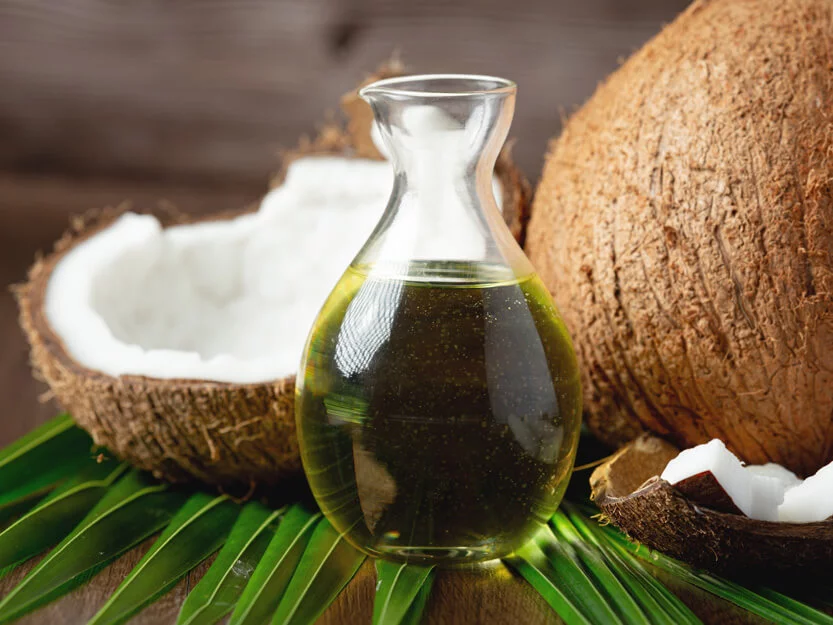
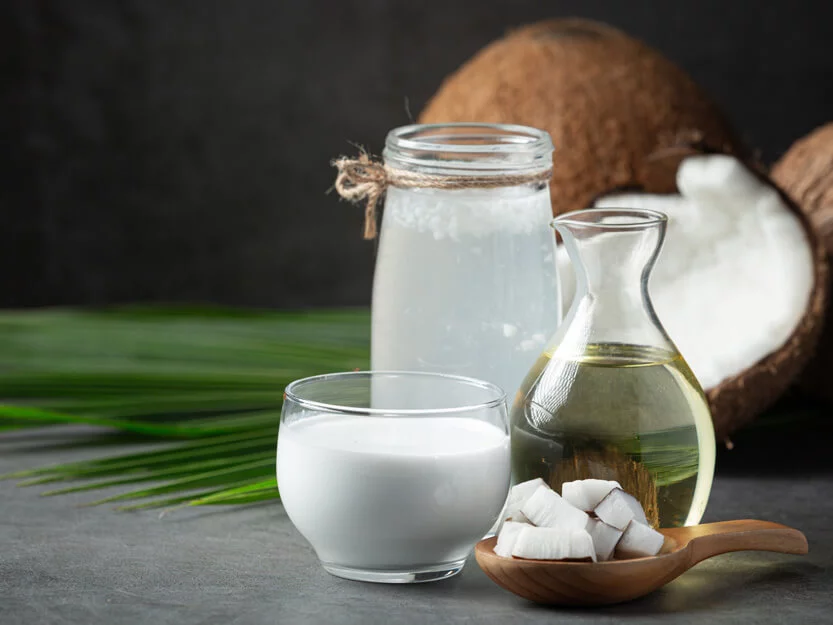
2. Coconut Water
Coconut water is a popular beverage known for its refreshing taste and numerous health benefits.
Coconut Water on an Empty Stomach: Is it Good for You?
Many people believe that drinking coconut water on an empty stomach can offer even more benefits, ranging from improved digestion to increased energy levels.
In this article of Coconut Oil Face Mask and Coconut Benefits, we’ll explore the benefits and drawbacks of drinking coconut water on an empty stomach and whether it’s a good idea for you.
What is Coconut Water?
Coconut water is a clear, liquid found inside green coconuts. It is not to be confused with coconut milk, which is made from the grated flesh of mature coconuts.
Coconut water has gained popularity over the years due to its numerous health benefits and its ability to hydrate the body effectively.
Coconut water hydrates naturally with few calories and many electrolytes. It has important minerals like potassium, calcium, and magnesium, which help keep your body working well.
Benefits of Drinking Coconut Water on an Empty Stomach
Coconut water is a very healthy beverage. In addition to the several types of nutrients, it also has a lot of electrolytes.
It helps replenish your body’s electrolytes after physical activity. It also has many antioxidants that help prevent diseases and premature aging.
Coconut water is also a great source of hydration. It has a lot of potassium, which is excellent for your heart. Coconut water is also a good source of energy. It contains a lot of carbohydrates.
Coconut water is also beneficial for heart, liver kidney diseases. Consuming coconut kills stomach heat. Adding a tablespoon of lemon juice to their water and drinking it will relieve indigestion. Here are some most valuable benefits of coconut water:
• Mother’s Milk Acid
This water contains the acid of the mother’s milk, which is considered better than canned milk. The amount of salt in this water is so low that the red cells of the red blood are entirely preserved, which is why it is also called the universal donor.
• Blood Circulation
Coconut water improves blood circulation and cleanses the digestive tract. This natural water strengthens the immune system in the human body against diseases, making the body able to fight more viruses.
Coconut water contains a rich amount of electrolytes and potassium, among other things, which help to normalize blood pressure.
• Kidney Stone
People with kidney stones should make it a habit to drink coconut water, as this water has the power to break the stones and expel them.
A glass of coconut water can provide immediate relief if there is irritation in the urine or an infection in the canal.
• Improved Digestion
Drinking coconut water on an empty stomach is believed to aid digestion. Coconut water contains a high concentration of fiber, which can help regulate bowel movements and prevent constipation.
Additionally, coconut water contains enzymes that can break down food more efficiently, leading to better absorption of nutrients.
• Increased Energy Levels
Coconut water is a natural energy booster due to its high concentration of electrolytes. When consumed on an empty stomach, it can help replenish the body’s fluids and provide a quick energy boost.
Additionally, coconut water contains lauric acid, which can help boost metabolism and promote weight loss.
• Reduced Blood Pressure
Studies have shown that drinking coconut water on an empty stomach can help lower blood pressure levels. This is due to its high concentration of potassium, which can help counteract the negative effects of sodium in the body.
By maintaining healthy blood pressure levels, coconut water can help reduce the risk of heart disease and stroke.
• Improved Skin Health
Drinking coconut water on an empty stomach can also improve skin health. Coconut water contains cytokines, which can help regulate cell growth and prevent skin aging.
Additionally, coconut water contains antioxidants, which can help protect the skin from free radical damage and promote a more youthful appearance.
Drawbacks of Drinking Coconut Water on an Empty Stomach
• Upset Stomach
While coconut water is generally safe to consume, some people may experience an upset stomach when drinking it on an empty stomach.
This is because coconut water is acidic and can cause stomach irritation in some people. If you have a sensitive stomach, it’s best to consume coconut water with food.
• Blood Sugar Levels
Coconut water contains natural sugars, which can cause a spike in blood sugar levels when consumed on an empty stomach. This can be particularly problematic for people with diabetes or insulin resistance.
If you have a history of blood sugar problems, it’s best to consult with your healthcare provider before consuming coconut water on an empty stomach.
Summary
Drinking coconut water on an empty stomach can offer numerous health benefits, including improved digestion, increased energy levels, reduced blood pressure, and improved skin health.
However, it’s important to be mindful of the potential drawbacks, such as an upset stomach and blood sugar spikes.
If you’re new to drinking coconut water, it’s best to start with small amounts and gradually increase your intake.
Additionally, if you have any pre-existing health conditions or concerns, it’s best to consult with your healthcare provider before consuming coconut water on an empty stomach.
Overall, coconut water can be a delicious and healthy addition to your diet, but it’s important to listen to your body and consume it in moderation. By doing so, you can enjoy all of the benefits
3. Coconut Milk
Coconut milk is a natural dairy substitute used for centuries in the Indian subcontinent and Southeast Asia.
It is a flavorful, nutrient-rich beverage that is made by blending the water and meat of fresh coconut with spices like cardamom, cinnamon, cloves, coriander, and nutmeg.
Coconut milk is rich in nutrients like carbohydrates, proteins, and minerals and has been shown to have many health benefits.
Coconut milk is an excellent source of nutrients like carbohydrates, proteins, minerals, and vitamins. It is rich in antioxidants, which may help prevent cancer and protect against heart disease.
Coconut milk is also high in lauric acid, which has been shown to have antimicrobial properties. One of the most important benefits of coconut milk is that it contains medium-chain triglycerides or MCTs.
MCTs are a type of fat that can be digested more easily than other types of fats. They have been shown to help with weight loss and diabetes. Coconut milk is also a great source of potassium, an essential nutrient for maintaining the body’s fluid balance.
“Cream” and “milk” are used in various dishes. The rice is cooked with it to make Panama. Cook with taro leaves or drink it as a creamer for your coffee.
Coconut milk is made by processing hot water or milk to extract the aromatic compounds from the coconut extract and fiber.
Coconut Cream Keep the milk in the refrigerator until the coconut is on the surface. It is used in many vegetable and meat dishes to give them a unique flavor, including rice dishes.
The white fleshy part of the nut can be eaten raw or dried (exclusively) in the kitchen. Copra, the dried pulp of the seeds, is the raw material for coconuts.
Oil trays are used for cakes, tarts, candies, curries, and sweets. As the nut grows, it fills with a spongy mass called “bread”. If you want to eat it raw, you can do so, or you can roast it in its shell.
Coconuts are versatile. Kerala cuisine is one such example. Used in vegetable dishes. Avel, green bananas, drumsticks, various beans, and even green cashews are cooked in coconut milk and placed in sour yogurt with fresh coconut oil.
In Sri Lanka, coconuts are used to create unique dishes. Special light meals such as sweets, oils, and cakes are also available and are popular for special occasions.
Unripe coconuts have a pudding-like flavor and consistency and are eaten, rubbed with a cloth or squeezed to obtain a “cream” or “milk” and used in a variety of dishes.
It is used to season meat dishes and gives a unique flavor when combined with rice products. In many breakfast dishes, coconut chutney complements the dish perfectly. Several sweet confections are prepared with coconut milk and coconut.
You can cook with the white, fleshy part of the nut, either fresh or dried. Copra, the seed’s dried pulp, is the coconut oil source. Chopped copra is used in cakes, tarts, candies, curries, and candies.
When the nut sprouts, the cavity fills with a spongy mass called a “roti” that is eaten raw or roasted in a bowl over an open fire.
The sprouted seeds are eaten like celery. Coconut chutney is a staple in many breakfast dishes. There are some sweet treats made with coconut milk and cream.
Coconut milk is the best remedy for dry cough in children and dry cough caused by smoking. Mixing coconut milk with one tablespoon of honey and cow’s milk at night before bed will cure dry cough.
Summary
Coconut milk is a natural dairy substitute used for centuries in the Indian subcontinent and Southeast Asia.
It is a flavorful, nutrient-rich beverage that is made by blending the water and meat of fresh coconut with spices like cardamom, cinnamon, cloves, and coriander.
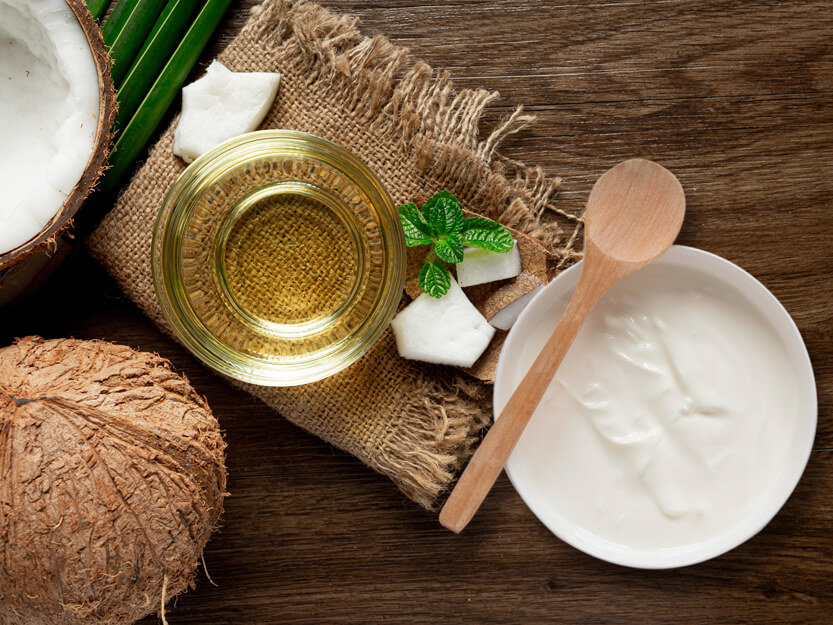
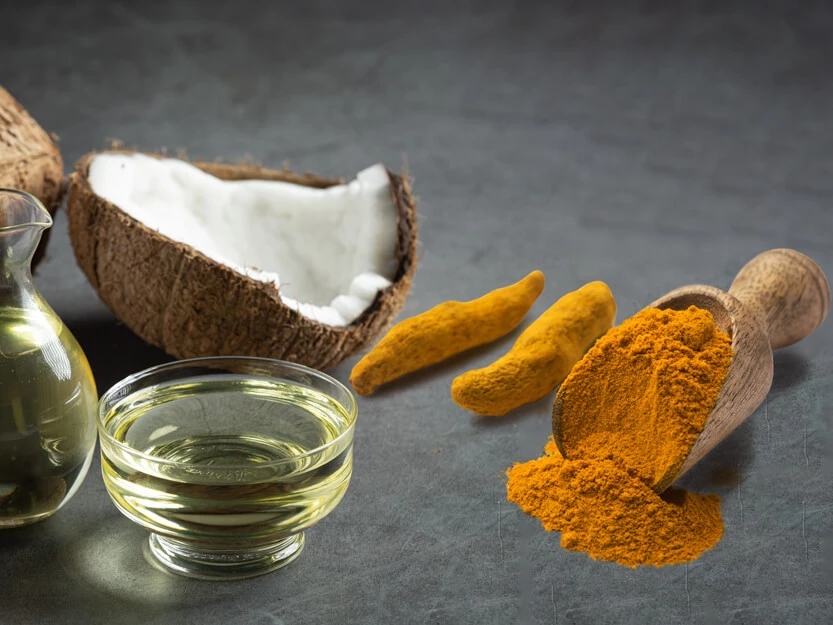
4. Coconut Flour
During manufacturing, coconuts are first cracked open and drained of liquid. The coconut meat is then scraped out, rinsed, grated, and strained to separate the solids from the milk.
The solids are then baked at a low temperature until dry before being ground into flour.
It can be used in place of wheat flour in a variety of recipes. It is a low-carb flour, so it is great for ketogenic diets. It is also a great substitute for other low-carb flours like almond flour, coconut flour, and coconut milk.
It is a great flour to use in baking since it can be used to thicken sauces, increase the binding properties, and add a rich, buttery flavor. It also has a high fiber content, so it is great for digestive health.
The mild flavor of coconut flour makes it an excellent gluten-free flour substitute. Coconut flour is commonly used in gluten-free and grain-free foods such as cupcakes, bread, and cookies.
Also, coconut flour is a great option for those trying to eat healthier. It is a low-carb, high-fiber flour that is easy to digest.
It is also high in protein and fiber. Coconut flour is a great option for those on a ketogenic diet. It is also a great way to add a little bit of healthy fat to your diet.
Summary
The mild flavor of coconut flour makes it an excellent gluten-free flour substitute. Coconut flour is a low-carb, high-fiber flour that is easy to digest. It is also high in protein and fiber, so it is great for digestive health.
5. Coconut Sugar
Coconut sugar is a type of sugar that has been processed from the sap of the coconut. The sap is processed and dried, resulting in granular sugar that is used in desserts, baked goods, and other sweet dishes.
It also has a slightly sweet taste and is lower in calories than other types of sugar.
Coconut sugar is classified as low glycemic. Index food is considered healthy Compared to traditional white and brown sugars.
Coconut jaggery or dhiyaa hakuru (traditional Maldivian sugar) is formed from cloudy liquid when it boils quickly into syrup and then crystallizes a rich dark sugar, almost precisely like maple Sugar.
It can be used as a sugar substitute for Coffee, tea, baking and cooking. Coconut Sugar is rich in minerals and is a nutrient Source of potassium, magnesium, zinc, and Apart from iron. Vitamins are also found in them.
B1, B2, B3, and B6 Compared to Brown Sugar, coconut sugar has twice as much iron, four times as much. Magnesium and ten times more Contains zinc.
6. Coconut Meat
Coconut meat is the edible white flesh that lines the inside, also called the “kernel”. Coconut meat is used for making coconut oil, coconut cream, coconut milk, and desiccated coconut. Of course, you can also consume it fresh.
Coconut meat provides nutrient-dense fats as well as other potential health benefits.
Coconut meat provides some fiber but is high in fat, a substantial amount of which is saturated fat. Coconut oil is one of the most highly saturated of all plant-based oils and is best consumed in limited amounts.
7. Coconut Protein
Coconut protein is an excellent protein supplement that dissolves well in water. It is a wonderful plant-based protein that benefits everyone, especially vegans and vegetarians who struggle to get enough protein in their diet.
Coconut Oil is a popular and highly demanded product in the world. There is an abundance of coconut pulp from which to extract coconut protein. It is not only a good protein choice for you but an excellent choice for the planet.
8. Coconut Leaf
Coconut leaf is often used in Asian foods as an indicator of freshness. That’s because they have a unique smell and taste.
It’s an important indicator that the product is fresh, delivered fresh, and in pristine condition, which is why they’re the main ingredient in many Asian banh mi sandwiches.
A coconut leaf smells like a ripe banana but has a much sweeter, fruity scent.
Coconut leaf is a common herb in Southeast Asia used to flavor and preserve foods like salad, soup, and curries. Coconut leaves can also be used as a hair dye.
It’s very similar to the ingredient coconut oil and can be used to preserve any food for extended periods.
Coconut leaf is one of the most common kinds of herbal supplements or herbal teas. It’s used as a source of antioxidants, often in the form of tinctures or capsules.
Coconut leaf is often considered a safe and natural alternative to prescription medications.
Coconut leaves are edible. They are used as a source of flavoring and as a source of the spice. They can also be peeled to remove the primary texture, allowing food preparation.
The apical buds of mature plants are edible and known as “cabbage palms” (although cutting them kills the tree). The growing tip is called “palm heart” and has a rare flavor.
Summary
A coconut leaf smells like a ripe banana but has a much sweeter, fruity scent. Coconut leaf is a common herb in Southeast Asia used to flavor and preserve foods like salad, soup, and curries.
9. Pharmacology
The medicinal value of coconut has been known. From ancient times in India, Sushruta Samhita Madhura mentions Varga and I Narikera. As in Ayurveda, coconut is used after diseases. In chronic fever, acid gastritis; Pranam Sula Cracks in the feet, worms, sores, and vomiting.
Coconut water, flowers, oil, milk, and ash, are used medicinally. There are also diseases. Anti-inflammatory, anti-bronchitis, febrifuge, and anti-angiogenic.
The herb has numerous properties, including Anthelmintic, Antidotal, Antiseptic, Appetite Stimulant, Aphrodisiac, Astringent, Antiseptic, Expectorant (cough medicine), Diuretic, Hemostat, Pediculosis, Laxative, Cooling, Stomachic, Styptic, Suppurative, and Vermifuge.
The herb is widely used as a folk remedy for boils, alopecia, amenorrhea, asthma, bronchitis, rash, burns, cachexia, calculus, cold, constipation, cough, weakness, dysmenorrhea, earache, erysipelas, fever, and flu.
This remedy has several uses, including Gonorrhea, Hematemesis, Hemoptysis, Menorrhagia, Nausea, Phthisis, Pregnancy, Blisters, Scabies, Scurvy, Sore Throats, Colic, Swelling, Syphilis, Toothaches, Tuberculosis, Tumors, Typhoid, Ulcers, and Cancer.
There are also beneficial for anti-inflammatory, anti-bronchitis, febrifuge, and anti-angiogenic diseases. Coconut fruits are edible and mixed with yogurt for people with diabetes. Coconut fruits are given to newlyweds as an aphrodisiac.
Coconut fruits are edible, mixed with yogurt for diabetics, and given to newlyweds as an aphrodisiac. Ibn Battuta has mentioned. Residents of the Maldives enjoy tremendous benefits.
Aphrodisiac power and fish and coconut confirmed this from his own experience.
Summary
Coconut has numerous properties, including Anthelmintic, Antidotal, Antiseptic, Appetite Stimulant, Aphrodisiac, Astringent, and Expectorant.
Disadvantages
Coconut can be a food allergen. On the other hand, coconut food allergies are considered rare in Australia, the U.K., and the U.S. Coconut can be very toxic when it falls on people, cars, and homes. They can cause fatal accidents.
As a result, commercial coconut extracts cannot currently be used for skin prick tests in Australia or New Zealand.
Despite the low prevalence of coconut allergy in the United States, the U.S. Food and Drug Administration (FDA) began identifying coconut as a tree nut in October 2006.
Based on FDA guidelines and U.S. federal law, coconut-derived products can cause contact dermatitis. They are found in cosmetics such as hair shampoos, moisturizers, soaps, detergents, and hand washes.
Conclusion
Coconut is a popular item marketed as a superfood. When shopping for coconut products, it is essential to be aware of the difference in quality and price.
Coconut milk is a natural dairy substitute used for centuries in the Indian subcontinent and Southeast Asia.
It is a flavorful, nutrient-rich beverage that is made by blending the water and meat of fresh coconut with spices like cardamom, cinnamon, cloves, coriander, and nutmeg.
The Author’s Message
I hope you enjoyed my blog about Coconut Oil Face Mask and Coconut Benefits. I’m not saying that coconut is the perfect food for everyone, but there are many health benefits. I encourage you to try coconut to see if it helps your health.
If you’re uncertain about what to do, I would love to hear from you through this blog post.
Thank you for reading. I’m always excited when my blog posts can provide helpful information on a topic like this!
FAQs
Coconut is used in many dishes and drinks to give them an extra layer of flavor. For example, in tropical drinks, coconut is often used on top of the drink and in Indian cuisine, coconut is commonly used on top of curries.
Coconut is also used as a medium for cooking, like coconut milk and coconut flour.
1. Gently rub one tablespoon of coconut oil between your hands. The liquefied oil has a silky, light texture.
2. Sweep over the face and neck. Coconut oil can also be used on the chest and other dry areas of the body.
3. Gently remove thick residue with a soft cloth. Do not use cotton balls, as they will stick to the oil on your face.
4. Leave a thin layer of coconut oil on your skin overnight.
5. Avoid getting coconut oil in your eyes, as it can temporarily blur your vision.
6. It also works as a makeup remover. Just perform the same steps twice. Gently removes makeup with just one swipe, leaving a light layer on the skin after use.
The coconut tree is the most important plant in the ecosystem because it has the highest biomass and the longest lifespan. It is a tree that provides fruit, a food source for animals, then food for humans who consume the fruit.
The coconut tree has many uses, including coconut fiber, copra, oil, and building material.
The coconut is unique because it is the only fruit that is a nut and contains a seed. Additionally, coconut is unique because it contains 50% coconut water. Coconut is a unique fruit because it tastes different in every part of the world.
Coconuts contain many nutrients, including B vitamins, potassium, magnesium and iron. Coconuts are also high in medium-chain fatty acids, the good fats that make coconuts unique.
Yes, of course! Coconut is an excellent food for your skin because of its rich, creamy texture. It’s also a wonderful source of healthy fats and contains vitamins E, B2, and B6, which help to protect skin from the sun. This is an awesome superfood because it’s great for your overall health.
Coconut is not a harmful ingredient or good for your hair. Coconut oil is good for your hair, but coconut itself is not. Coconut oil is good for hair because it prevents hair loss.

